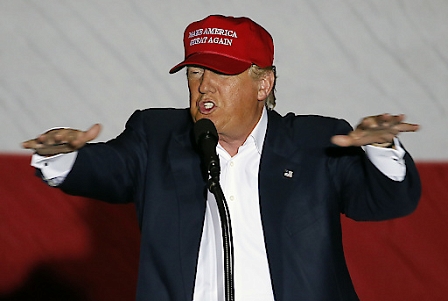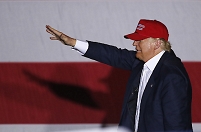Erstellt am: 15. 3. 2016 - 17:03 Uhr
How much could Trump get away with?
FM4 Reality Check
Hear the programme in the FM4 Player or subscribe to the podcast and get the whole programme after the show
By this time tomorrow, there is a very real possibility that Donald Trump could have secured the Republican presidential nomination. Even if he hasn't, he will almost still be the hot favourite.
So, maybe it's time to think about what would happen if he really did go all the way to the White House? Could he really implement all these crazy sounding plans? A wall between the US and Mexico, deporting millions of people, sanctioning torture and targeted killings of not just terrorists, but also their families?

Georgetown Law
When you think about the huge implications of the power wielded by the POTUS, you have to think, "With all the departments and administration of the US government, wouldn't someone stop him?"
Rosa Brooks from at Georgetown University Law Center, is in Vienna this week, delivering a series of lectures on The Future of War and the Future of Law at the Institute for Human Sciences. Her answer to that question is a sobering one.
RB: I wouldn't count on it. On the one hand, bureaucracy is bureaucracy, and as essentially every single president, every leader of any bureaucracy inevitably finds, all that political power does not automatically translate into the ability to do anything you want, because the bureaucratic machinery is, by its nature, slow and cautious. So, on the one hand, I certainly think that the bureaucratic machinery of the US government would have a powerful braking effect, even on a Donald Trump, on the other hand I don't think that should make us too comfortable, because things can change more rapidly than you might expect. The obvious example of this would be the United States after the September 11th attacks. If you had asked me on September 10th, 2001, whether it was remotely conceivable to me that political leaders and intellectuals in the United States would be having serious debates about the legality and morality of torture, I would have said, "Of course, not! That's crazy! Everybody knows, there's complete consensus across the political spectrum in this country that torture is impermissible, immoral, illegal etcetera!" and it took about one month for that to change.

AFP PHOTO / RHONA WISE
Particularly when there's a shock, and I think if you had Trump plus a shock, a big terrorist attack, for instance, I wouldn't rule out the possibility that norms could change very rapidly, and the entrenched bureaucracies would not have any ability to stop it, although they might slow it. I think that the debate that came out of some of the comments that Donald Trump made a couple of weeks back, when he said, "I would order waterboarding and worse, and I would target the wives and the families of terrorists....
JB: Aren't those two different things, though? Waterboarding is one thing, and torture, but actually saying you're going to kill people who are ostensibly innocent civilians is a different level altogether, isn't it?
RB: Both are illegal. In fact, arguably, the international legal prohibitions on torture are more absolute than the legal prohibitions on killing civilians in armed conflict, because it's not unlawful to kill civilians in an armed conflict - you're not supposed to target them, unless they are directly participating in hostilities, but that's a pretty malleable term, particularly today. In the age of terrorism, and cyber attacks, and so on and so forth, I don't think it would be terribly difficult for a Donald Trump, if he really wanted to target the families of terrorists, to find some lawyers who would be willing to make the case that they're providing material support, or they're participating in some other way directly in the hostilities.
I think, while the US military as a very strong rule of law culture, I think if Donald Trump or anyone else said to any officer in the US military, "I order you to commit a war crime." that that officer would say, "No, sir." But, if that officer is told, "I order you to target those individuals over there." and the officer says, "But, but, but... aren't they just civilians?" and is told, "No, no, no, we're had an exhaustive legal analysis done, and we have determined they are legal targets owing to the fact that they are participating directly in hostilities in the following way, here's the 40 page memo. I order you to carry out my acts as Commander in Chief." I think it would be very, very difficult for that officer so say anything other than, "OK. Yes, sir." I think the trouble comes if you have tame lawyers, it's not that hard to persuade people that your orders are not manifestly unlawful.
JB: You're worked in the Pentagon. What's the mood among this community in the United States about the potential prospect of a President Trump?

AFP PHOTO / RHONA WISE
RB: People are just appalled. I think people are just stunned, and I think that's true both within the Democratic establishment and within the Republican political establishment. There was a group letter signed by a number of very prominent Republican national security and foreign policy experts essentially saying, "Trump is appalling", and it's not that easy to appal some of these people! So, I think the mood is horrified and a little bit frightened, and a bit disbelieving, still. I think people are really in shock. No one expected Trump to get this far, so now people are saying things like, "Well, of course, he could never win the general election." and I hope that that's right.
The one good thing is that I am finding myself, as someone who's been, for years, going round saying that we need to tighten up the rules on US drone strikes, and targeted killings, because right now the US government is saying, "Trust us. We can decide who should be killed, we'll make good decisions, they'll be legal, don't worry. We can't tell you about them, but just trust us."
Now, I'm saying to people, "OK, you feel OK about President Obama making these decisions in a cloak of secrecy, how do you feel about Donald Trump doing it."
People go, "Oh, yeah." (Laughs). So, ironically, it may be a motivating force for people in Congress, in particular, to get serious about tightening some of the rules that they have been uninterested in tightening so far.
Dieses Element ist nicht mehr verfügbar
FM4 Reality Check
Monday to Friday from 12.00 to 14.00, Saturday from 12.00 to 13.00, and after the show via Podcast or fm4.orf.at/realitycheck.



